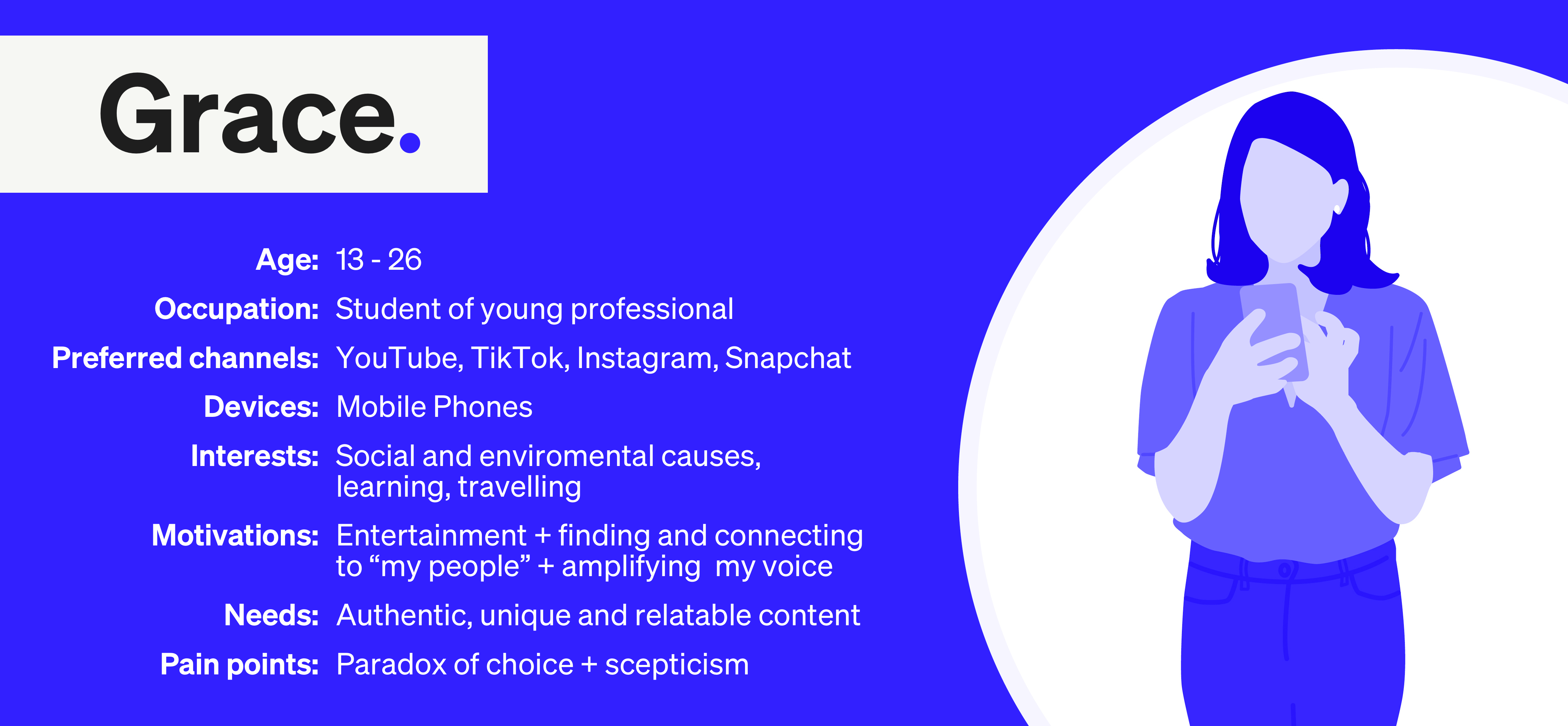Generation Z provides a great opportunity for business growth as it makes up more than a third of the world's population, with a purchasing power worth $360 billion. However, Oxford Economics predicts this to reach $3 trillion by 2030, since Gen Z spends more than any other generation.
Learn about Gen Z as an audience, their unique online behaviour and user trends for your next successful campaign.
Who is Generation Z?

Generation Z - also known as iGeneration or Zoomers - are people born from 1997 to 2012. As their nicknames hint, Gen Z are digital natives as they grew up surrounded by the Internet and evolving technology. The generation also represents the second most ethnically diverse generation in the UK. Shaped by political unrest, economic uncertainty and a pandemic, Gen Z tends to be pragmatic and risk-averse, but carries a strong interest in social and environmental causes.
Note: When classifying a generation, we refer to people who coincidentally share common traits, such as encountering the same significant historical, political or economic events. As these factors can change based on geological and cultural context, there is no single agreed timeline for any generation.
User Behaviour and Trends
As the generation grew up in the digitalised and globalised world, there are prominent patterns in Gen Z's online behaviour and international trends.
The Power of User-Generated Content
Gen Z users are the perfect brand ambassadors for any business due to their high production of user-generated content (UGC). The rise of different social media gave the generation a place to utilise one of their digital talents: producing creative ideas. In fact, 60% of the content from Gen Z is of a creative nature.
On top of the self-produced content, another common trait of Gen Z is a significant amount of interaction with both companies and other users. And, since Gen Z consume content themselves, other users perceive them as unbiased, trustworthy and authentic. By organically promoting different products and services, they not only spread brand awareness and electronic word-of-mouth among their Gen Z counterparts, but they also create content for the younger Generation Alpha (born in the early 2010s), who greatly influence the shopping choices of 87% of Millennial parents.
As a result, encouraging UGC from Gen Z can open the door to different audiences for your business.
Social Media as Search Engines
To correctly target your Gen Z audience, you need to first learn about their preferences. Smartphones dominated as the device of choice for 75% of Gen Z. In fact, Gen Z comprises nearly 40% of mobile users. They mainly consume social media on their devices for about three hours in total per day. Particularly, YouTube, TikTok, Instagram and Snapchat are the top-used platforms by the generation.
Gen Z also often uses social media instead of search engines to research products and to decide on a specific brand. TikTok and Instagram, in particular, are emerging as the primary channels for B2C campaigns and discovering brands since 61% of Gen Z engage with businesses on TikTok organically or through curated ads.
Short-form vs Long-form Videos
Gen Z is infamous for having a short attention span, as the influx of new technology called for distributing attention while making connections between several topics. However, a Google report identified that Gen Z tend to immerse themselves in hours-long video content that resonates with their interests. Instead, 59% of Gen Z use short-form videos to explore content that they will later delve into through longer videos.
As Gen Z's primary motivation for browsing the Internet is entertainment to escape from their daily routine and connect to “their people”, video marketers should incorporate humour, authenticity or relatability in their campaigns. In fact, 63% of the Gen Z audience says they click on video ads more than any other format.
Value and Transparency Driven
What sets Gen Z apart from other generations is "the search for truth". As some of the events that shaped Gen Z involve growing awareness of social and environmental issues, the generation does not only value diversity and inclusion, they expect it. Brands that act on societal causes are four times more likely to be purchased from and 34% of Gen Z are more willing to pay a higher price for brands that support matters they care about.
The brand's messaging should be always transparent and backed up by actions since the scrutiny of Gen Z allows them to find information about the company outside its official website or social platforms.
Target Gen Z Audience with M3.agency
Here at M3.agency, we understand the power and influence of Gen Z and offer a range of expert services whether you need to develop a mobile-first content strategy, a video campaign or a mobile-friendly website. Contact our helpful team for a free quote today.






